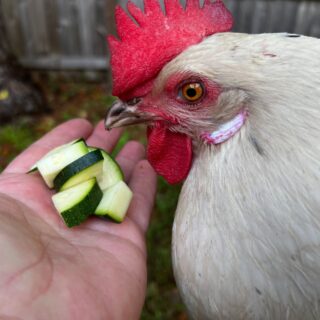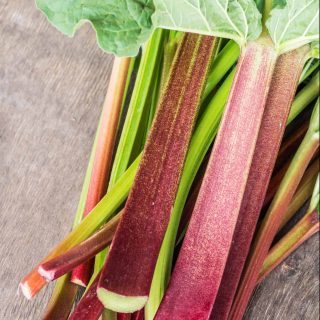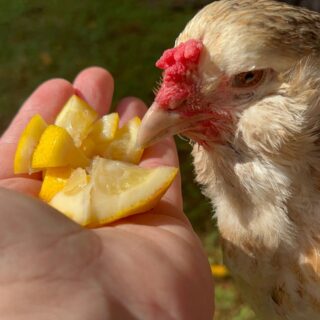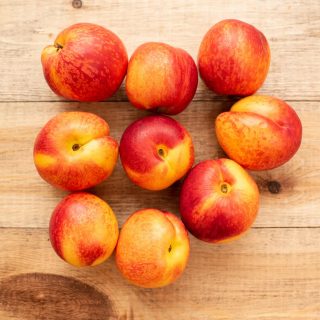Yes, chickens can eat oranges as long as they are given in moderation. They are packed with essential nutrients. Though they can be hit or miss if chickens like them due to their slight tartness.
Keep scrolling to get all the details on how to feed them, what their benefits are and any watchouts you should know about.
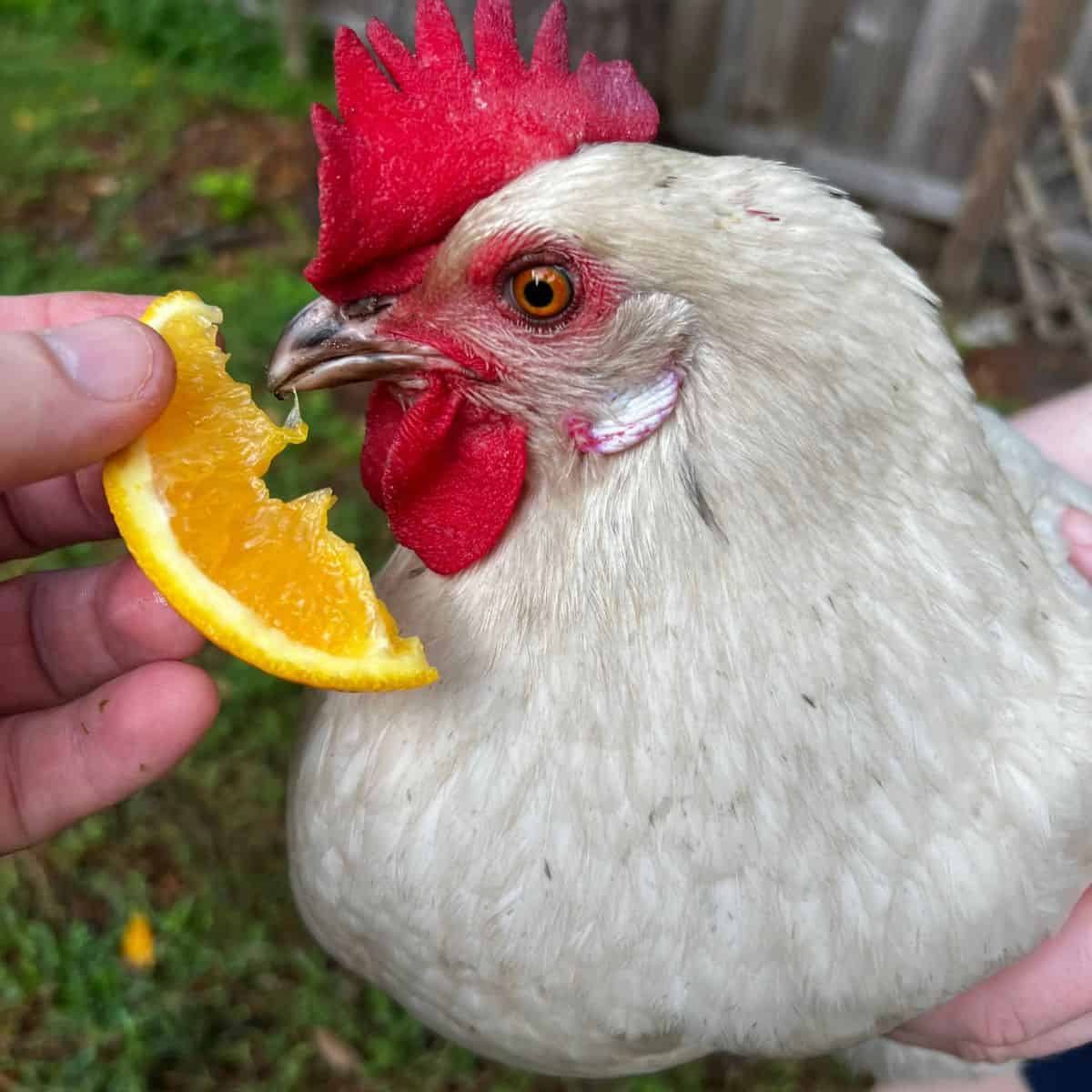
Jump to:
Are Oranges Safe for Chickens?
Yes, oranges are safe for chickens. Despite what you may have read on the internet, chickens can eat lemons, grapefruit, tangerines and other citrus like oranges are with them being no more harmful than any other fruit.
We aren't sure where the "danger of citrus" claims come from. But there are actual studies showing there are actually benefits such as immune benefits from orange peels being fed to chickens.
Of course, whenever you feed any treats, you want to do so in moderation and do regular health checks on your chickens to keep tabs on their health. As with any fruit, especially those high in sugar, like when chickens eat peaches, when chickens eat nectarines, when chickens eat cranberries, and when chickens eat raisins, too much can become unhealthy.
Can Chickens Eat Orange Peels?
Assuming the peel does not have any wax or pesticide residue left on it, the peel is perfectly fine to give to your chickens. However, because of it's tough leathery texture, they will probably make use of orange peels as chicken toys rather than snacks.
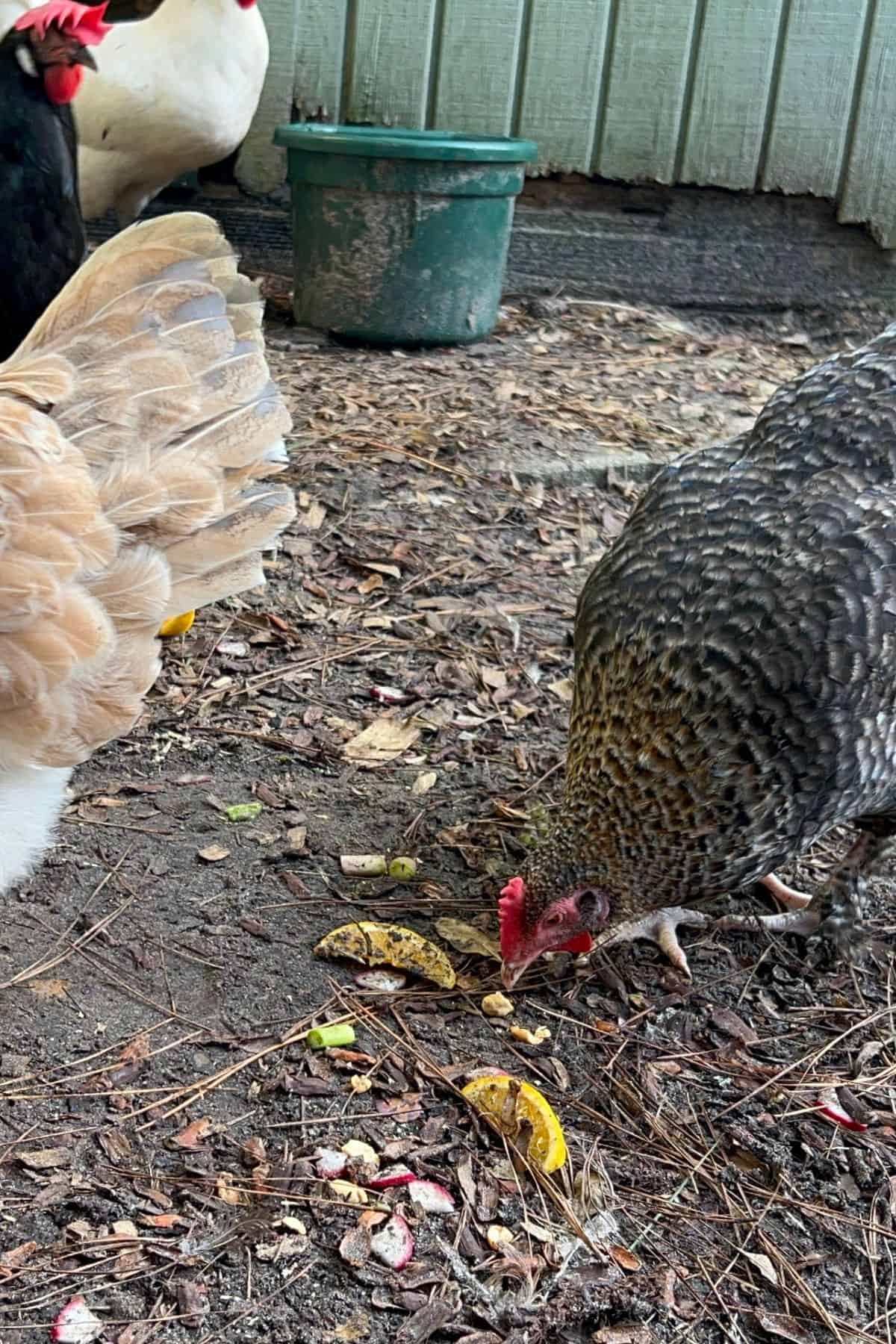
How to Feed Chickens Oranges
It's super easy to feed oranges to chickens. Here are the steps you should take:
- Peel the orange first (optional). If you aren't peeling it, wash the peel to remove wax and pesticides. Plus they don't like the peel much usually.
- Cut the orange in half, quarters or into wedges.
- Toss the orange pieces out to your flock.
As when feeding any treats, make sure to keep an eye on your flock and notice any changes to appearance and health. Also, make sure they eat all of the treats before the end of the day as you don't want them sitting out and going bad or attracting pests.
Need some help keeping your chickens health and care taken care of? Check out the Organized Chicken Keeper for an easy to follow system.
Benefits of Oranges
In moderation, oranges can be very healthy. As you may already know, citrus fruits, including oranges, are rife with Vitamin C and, thus, can give your flock a HUGE boost in their immune systems.
There is evidence to suggest that prolonged exposure to citric and ascorbic acids can weaken the strength and thickness of their egg shells. So, just be aware of this and keep a watch on their egg laying.
Here are a few of the main nutrients in oranges and how they support your chickens:
- Vitamin C: helps with egg laying, immune and cellular support. To provide even more vitamin C, chickens can eat papaya.
- Calcium: helps with strong bones and egg shells. For more calcium, chickens can eat pears also.
- Potassium: supports hydration, electrolytes and temperature regulation.
- Fiber - supports GI health and absorption of nutrients. Chickens can eat watermelon and chickens can eat kiwi for even more.
The table below, courtesy of the USDA FoodData Center, has a breakdown of the nutritional analysis based on a serving size of 1 naval orange (140g).
| Name | Amount | Measurement |
|---|---|---|
| Water | 121.0 | g |
| Energy | 72.8 | kcal |
| Protein | 1.3 | g |
| Fat | 0.2 | g |
| Carbohydrate, by difference | 16.5 | g |
| Fiber, total dietary | 2.8 | g |
| Sugars, Total NLEA | 12.0 | g |
| Calcium, Ca | 60.2 | mg |
| Iron, Fe | 0.5 | mg |
| Magnesium, Mg | 15.0 | mg |
| Phosphorus, P | 32.2 | mg |
| Potassium, K | 232.0 | mg |
| Sodium, Na | 12.6 | mg |
| Zinc, Zn | 0.2 | mg |
| Copper, Cu | 0.1 | mg |
| Vitamin C, total ascorbic acid | 82.7 | mg |
| Folate, total | 35.0 | µg |
Feeding Chickens Oranges FAQs
All treats should be given at a minimum. Try to keep it to around 1 time a week. Or, if giving super small amounts, you could give 2 - 3 times a week.
It's best to not feed chicks oranges. They are so small and you don't want to throw their nutrient balance off.
Yes, chickens can eat lemons, tangerines, clementines and more. They can also eat mandarin oranges as long as no sugar has been added.
If you need more help with taking care of your chickens, check out The Organized Chicken Keeper for a complete system for managing their health through keeping their supplies stocked and coop clean.

